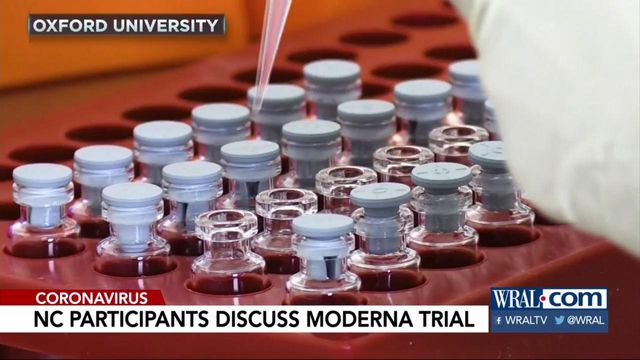Moderna trial participant: 'This is some hope'
Katie Stewart of Chapel Hill didn't see herself as a medical guinea pig, but when the opportunity came to participate in a trial of a COVID-19 vaccine, she did her research then saw it as a way to contribute to society.
Posted — Updated"I’m not a health care worker. I’m not on the front lines," she said, "But it was something I could do to get us out of this, even if it’s just one day sooner."
Stewart and her parents, Terry and Betsy Cantrell, participated in the trial of a Moderna vaccine facilitated by the University of North Carolina at Chapel Hill.
"UNC did a top-notch job running this trial," she said. "I feel confident that this study was run very, very well. I feel confident in the results, and I feel confident in the technology."
Stewart was thrilled when Moderna announced Monday that its vaccine is 94.1% effective, and that its study of 30,000 people has met the scientific criteria needed to determine whether the vaccine works. The finding from the complete set of data is in line with an analysis of earlier data released Nov. 16 that found the vaccine to be 94.5% effective.
The first injections may be given as early as Dec. 21 if the process goes smoothly and approval is granted, said Stéphane Bancel, the company’s chief executive.
Bancel said the company was “on track” to produce 20 million doses by the end of December, and 500 million to a billion in 2021. Each person requires two doses, administered a month apart, so 20 million doses will be enough for 10 million people.
"I’m really, really encouraged. I’m happy," Stewart said.
Although the conditions of the trial prevent her from knowing whether she got the vaccine or a placebo, Stewart is convinced she did because she had some minor symptoms.
"It was nothing terrible. I was acutely aware of it just because I knew I had the vaccine, so I was paying attention to it," she said, describing a low-grade fever and fatigue that lasted for a few days.
"I do feel like this is some hope, hope to getting my life back," she said.
Duke researcher Dr. Tony Moody and his family also participated in the UNC study.
He says the results of Duke's Pfizer trial and UNC's Moderna trial are encouraging, but more work needs to be done.
"It’s pretty amazing to have a hand in all of this and feel like I’m making a contribution, both as a participant and on the research side," he said.
Stewart, a mother of sons ages 6 and 8, said she's not ready to go out to bars, but she is looking forward to a return to travel.
Moderna is the second vaccine-maker to apply for emergency use authorization. Pfizer submitted its application Nov. 20. Pfizer has said it can produce up to 50 million doses this year, with about half going to the United States. Its vaccine also requires two doses per person.
More than 70 coronavirus vaccines are being developed around the world, including 11 that, like Pfizer’s and Moderna’s vaccines, are in large-scale trials to gauge effectiveness.
Moderna’s application for emergency use authorization will include data from its Phase 3 study of 30,000 people. The application, several hundred pages long, will also include several thousand pages of additional data.
FDA scientists will examine the information, and the application is likely to undergo a final review Dec. 17 by a panel of expert advisers to the agency, Bancel said, adding that he expected the advisers to make a decision within 24 to 72 hours. The FDA usually follows the recommendations of its advisory panels.
Bancel said that Moderna had not yet begun shipping vaccines across the country, and would not do so until the emergency authorization is granted.
The government has arranged to buy vaccines from both Moderna and Pfizer and to provide it to the public free of charge.
Shares of Moderna surged more than 15%, to $147, by mid-morning on the company’s announcement Monday. Both Moderna’s and Pfizer’s vaccines use a synthetic form of genetic material from the coronavirus called messenger RNA, or mRNA, to program a person’s cells to make many copies of a part of the virus. That viral fragment sets off alarms in the immune system and trains it to recognize and attack if the real virus tries to invade.
No mRNA vaccine has reached the market before, and the candidates from Pfizer and Moderna have faced considerable skepticism from scientists and a wary public.
But the strong results from both vaccines have begun to quash the doubts.
So far, neither vaccine has had serious side effects, but many recipients have had headaches, mild fevers, fatigue, joint and muscle aches and sore arms for a day or two.
Of the 30,000 people in the Moderna study, half were vaccinated and half received placebo shots of salt water; neither the participants nor their doctors knew who got what. Then, researchers monitored the participants to see who contracted the coronavirus, and watched for side effects.
Bancel said he considered the statistics about prevention of severe disease the most important data from the study.
“This is why I think this vaccine is going to be a game-changer,” he said. The vaccine will reduce hospitalizations and deaths, he added, “and I hope get this country back to its pre-pandemic state.”
Moderna said it was also seeking authorization to market its vaccine in Europe, Canada, Britain, Israel and Singapore.
Related Topics
• Credits
Copyright 2024 by New York Times News Service and WRAL.com. All rights reserved. This material may not be published, broadcast, rewritten or redistributed.






